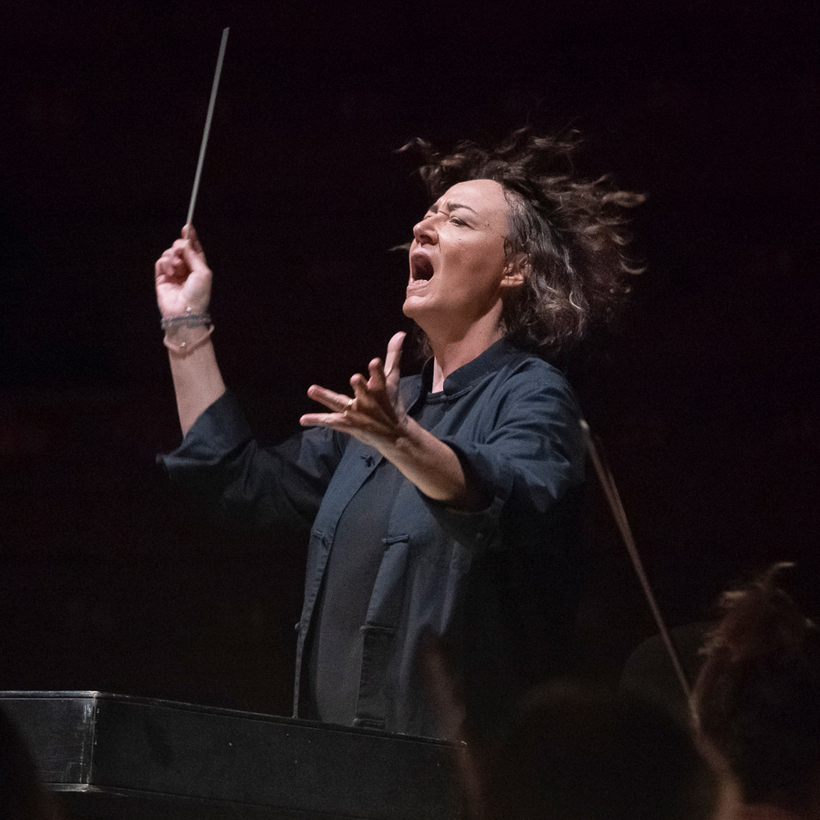Authority in a conductor is a quality of which our ears must be the judge, but that’s not to say there aren’t visual cues beforehand. The renowned French contralto Nathalie Stutzmann, 57, now embarked on her second career as a maestro in the grand tradition, likes to eat fire in the big romantic and post-romantic repertoire. But stepping onstage in signature pantsuit and open collar, she doesn’t telegraph the Sturm und Drang ahead. She acknowledges the audience’s welcome without basking in it, smiles, and turns to the job at hand. That’s when she throws the switch.
The electricity Stutzmann generates has quickly won her such plum assignments as principal guest conductor with the Philadelphia Orchestra and music director of the Atlanta Symphony. Women on the podium are no longer the black swans they used to be, yet the she-colossus who bestrides the profession like a Karajan, a Solti, a Bernstein, a Muti, or now a Dudamel remains a chimera. (See Tár.) Could Stutzmann be the one?
This spring marks her debut season with the Metropolitan Opera, and her rising stock is apparent in back-to-back new productions of Mozart’s demonic tragicomedy Don Giovanni (in Italian, directed by Ivo van Hove, opening May 5) and the populist fairy tale Die Zauberflöte (in German, directed by Simon McBurney, opening May 19). Mind you, Stutzmann’s operatic interests lie chiefly in the 19th century. But the Met offered the two Mozarts, and with schedules upended by the pandemic, she wound up with the doubleheader. “They’re beautiful works,” Stutzmann said on a recent call from Paris. “I would have been crazy not to accept.”
MATTHEW GUREWITSCH: You were always the kind of singer whose voice is her “fingerprint,” instantly recognizable. Can a conductor be recognizable in the same way? If so, is that even desirable?
NATHALIE STUTZMANN: A top orchestra has its personal sound identity, but it changes depending on who is conducting. People say conductors don’t make sound, but we do. It’s magical. You imagine the sound you dream of, and your body finds a way to express it—because you can’t talk at that moment. You show.
M.G.: When people talk about “singers’ conductors,” it can be a left-handed compliment, meaning that they let the singers indulge themselves. As a singer yourself, would you consider yourself a singers’ conductor?
N.S.: In my core repertoire—Wagner, of course, or Tchaikovsky’s Pikovaya Dama, or Carmen—everything comes from the orchestra. So as a conductor you’re never accompanying. First make the orchestra sing, then use my inner drive to shape the phrase. I know how difficult it is to sing. I know what the singers need. That doesn’t mean compromising with the music or the style. In opera, a conductor has to be really flexible. It’s like piloting a twin-engine Cessna, making constant little adjustments, depending on the atmospherics. With a symphony, you do a lot of hard work in rehearsal, but the performance is more like flying a Boeing, with lots of electronics.
M.G.: Have you seen Tár?
N.S.: Of course.
M.G.: Marin Alsop, who resembles the title character to a degree, says the movie offends her “as a woman, a conductor, and a lesbian.” Do you find it offensive?
N.S.: For me, it’s a movie. It’s not a biopic. It’s about an imaginary person. What it says about power and how you deal with it is ambiguous. I ask myself if it’s not a sign of equality to see a woman behaving in ways you usually attribute more to men. Cate Blanchett’s performance is fantastic. I enjoyed it very much.
M.G.: Does it get some things right?
N.S.: It’s not made to be wrong or right. It’s a movie.
M.G.: Let me try this another way. “Representation” is such a buzzword today. But when we do our work, whatever it is, are we representing some demographic? Personally, I mostly think I’m just being me.
N.S.: Exactly. For me, Tár isn’t a representation; it just shows us this person called Lydia Tár, who is the way she is. Political correctness is so boring—such a negation of what the dimensions and personalities and looks are of different people. I love this kind of diversity—not the politically correct thing. That’s an art killer.
Don Giovanni will be on at the Metropolitan Opera from May 5 through June 2
Die Zauberflöte will be on at the Metropolitan Opera from May 19 through June 10
Matthew Gurewitsch writes about opera and classical music for AIR MAIL. He lives in Hawaii

